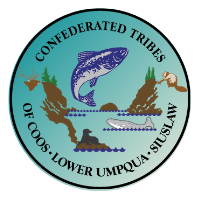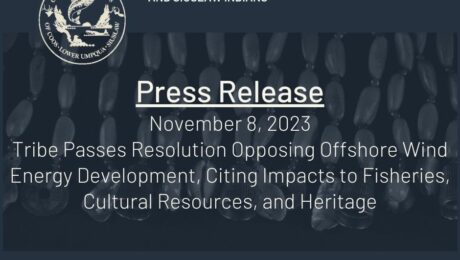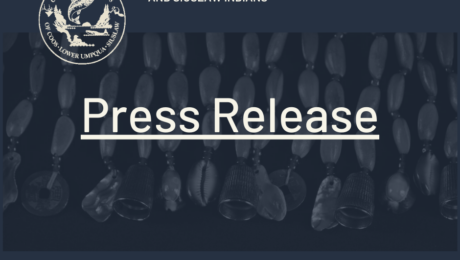TRIBE PASSES RESOLUTION OPPOSING OFFSHORE WIND ENERGY DEVELOPMENT, CITING IMPACTS TO FISHERIES, CULTURAL RESOURCES, AND HERITAGE
November 8, 2023, COOS BAY, OREGON – The Tribal Council of the Confederated Tribes of the Coos, Lower Umpqua and Siuslaw Indians (“Tribe”) unanimously passed a resolution expressing its opposition to offshore wind energy development off the Oregon Coast. The resolution corresponds with the deadline for comments on the federal Bureau of Ocean Energy Management (“BOEM”) two draft Wind Energy Areas (“WEAs”) for development of wind energy in areas near Florence and Brookings.
“After meetings with the Director of BOEM, it was apparent to the Tribe that its concerns regarding offshore wind development’s impacts to fisheries and cultural resources were not going to be addressed in a meaningful way,” said Tribal Council Chair Brad Kneaper. “The Tribe has not taken a position for offshore wind, but rather, we are at the table to learn about the impacts. We recognize that all energy development has impacts and BOEM has failed to provide assurance that wind energy development will do good and not harm the Tribe, its members, and the greater coastal community.”
In multiple communications with BOEM, including comments submitted this week on the WEAs, the Tribe has consistently raised concerns about wind energy development. These comments include a request that important, cultural viewsheds be excluded from the WEAs and that wind development avoid areas critical to resident and migratory species, including important areas for fishing.
“The Tribe also has consistently asked BOEM to exclude important fishing areas from wind energy development. Fishing is an important industry on the Coast that employs tribal members and supports tribal businesses. Fish, including salmon, are also an important cultural and subsistence resource to the Tribe. Any impact to fish from wind development is going to harm our local jobs and the Tribe,” said Chair Kneaper.
“Standards for green infrastructure should not be less than other energy development,” said Vice Chair Doug Barret. “Green infrastructure must not trump the federal government’s obligations to protect tribal resources. That is simply green colonialism. Because an energy is renewable is not justification enough to rush a process, to ignore or minimize adverse impacts to our community, environment, or cultural resources.”
“The Tribe remains open to working with the BOEM to resolve the issues raised in our comments,” said Chair Kneaper. “We plan to provide comments to BOEM on the WEAs, to provide testimony at the public hearings, and to coordinate with our local and state partners to address our concerns.”
“BOEM has demonstrated it is not serious about listening to the concerns of the Tribe or of our coastal communities,” said Chair Kneaper. “During a recent meeting, BOEM failed to follow through on a public testimony held in Coos Bay, and we repeatedly hear from our local government partners that BOEM has failed to connect or provide information about the impacts of wind energy development.”
The Tribe’s resolution echoes the concerns of other local governments, including Lane County and Coos County, which has expressed opposition to wind energy development, and resolutions of regional and national tribal organizations, including the National Congress of American Indians, which has called for a halt to the approval process until BOEM develops a process to consider Tribal impacts.
“This process is running roughshod over Tribal concerns, the concerns of commercial fishing, and local government. The Biden’s Administration of 30 gigawatts of wind energy by 2030, while an admirable goal, should not provide a blank check for BOEM to disregard the coastal resources that we hold dear,” said Chair Kneaper.
“The Tribe has called the Coast our home since Time Immemorial,” said Vice Chair Barrett. “The unique landscape, places of religious significance, viewsheds and traditional resources of our Ocean, bays, upland dunes, forests, archaeological features, cultural resources, and first foods connect us to our tribal ancestors. Our homelands and Ocean have been the foundation of our way of life since time immemorial and remains a cornerstone of our Tribe to this day. As a confederation of coastal tribes deeply dependent on the Ocean and its rich resources, we assert a direct interest in the viewshed extending from our shores, encompassing a distance of at least twelve nautical miles beyond the continental shelf. We believe it is our inherent right to have the ability to see across our viewsheds, as this direct connection is integral to our cultural practices and traditional way of life. This connection empowers us to protect and conserve our cultural resources for the prosperity of our future generations. Our religious beliefs, traditional practices, fishing, first foods and relations are interconnected and influenced by all that is encompassed in the broader Ocean.”
In its October 31, 2023 comments to BOEM, the Tribe called upon BOEM to halt its process to allow for consideration of impacts of wind energy, including consideration of a congressionally mandated National Academy of Science study on wind energy impacts to fisheries on the West Coast.
The Resolution passed by the Tribal Council makes it clear that the Tribe will take all necessary action to oppose BOEM’s actions or otherwise ensure that invaluable natural and cultural resources are protected.
A copy of the Resolution and October 31, 2023 comments to BOEM are included with this press release.
- Published in Public Notices, Tribal Event, Tribal News
Press Release
October 1, 2021
Media Contact:
Debbie Bossley, Tribal Council Chair
FOR IMMEDIATE RELEASE: The Confederated Tribes of Coos, Lower Umpqua and Siuslaw Indians’ Tribal Council vote to give emergency funds to all Tribal Government and Enterprise employees.
Florence, Ore. — The Confederated Tribes of Coos, Lower Umpqua and Siuslaw Indians is pleased to announce the Tribal Council met September 29, 2021 and voted unanimously to approve Emergency COVID -19 Assistance to all qualified current full and part time employees of CTCLUSI Tribal Government and all Tribal Enterprises, this includes Three Rivers Casino Florence and Coos Bay, Ocean Dunes Golf Links, and Blue Earth.
The Tribal Council has determined, it is imperative to provide general welfare assistance on an emergency basis to Eligible Citizens experiencing financial needs resulting from this national pandemic incurred between March 1, 2020 and October 1, 2021 including, but not limited to, increased costs of living expenses such as food, housing, utilities, medical and other anticipated and unanticipated living expenses and income losses.
Tribal Council Chair, Debbie Bossley said, “COVID-19 has affected our Tribal community much longer than imagined. Tribal Council recognizes that it has had some devastating effects on many of us. We are honored to have the resources to offer assistance to staff and their families during this difficult time.”
This is to provide emergency economic assistance to Eligible Citizens, who have experienced financial hardships during the COVID-19 Pandemic, utilizing CARES Act funding in the amount of $1,000.00 for each approved eligible applicant.
About the Confederated Tribes of the Coos, Lower Umpqua, & Siuslaw Indians
The Confederated Tribes of Coos, Lower Umpqua and Siuslaw Indians is a federally recognized Tribe made up of 3 tribes (4 Bands): 2 bands of Coos Tribes: Hanis Coos (Coos Proper), Miluk Coos; Lower Umpqua Tribe; and Siuslaw Tribe. The Tribes trace their ancestry back to the aboriginal inhabitants of the South-Central coast of Oregon. The Tribes employs more than 600 employees through its government and enterprise functions. For more information, visit ctclusi.org.
- Published in Tribal News


